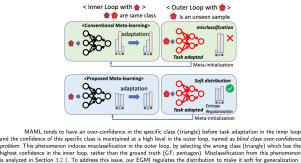Entropy-Guided Meta-Initialization regularization for few-shot text classification
IF 7.6
1区 计算机科学
Q1 COMPUTER SCIENCE, ARTIFICIAL INTELLIGENCE
引用次数: 0
Abstract
Meta-learning has emerged as the dominant approach for tackling the problem of limited datasets in text classification and achieved state-of-the-art performance. In particular, gradient-based meta-learning finds good meta-initialization (parameters) through learning on a variety of tasks, which is known to be effective for the few-shot problem. However, we find that meta-initialization of the existing method has an over-confidence for the specific class before task adaptation, which potentially leads to deterioration in generalization performance. To address this issue, we propose a simple and effective Entropy-Guided Meta-Initialization regularization (EGMI) method. The proposed EGMI focuses on maximizing entropy so that the model has meta-initialization to prevent over-confidence for specific classes. In our experiments, we show that EGMI outperforms the current state-of-the-art methods on few-shot benchmark datasets by a large margin. In particular, we achieve a performance improvement from 84.13% to 91.36% on the 15-way 5-shot of the clinc150 dataset. We also do not need any additional parameters and the training cost does not increase. Our code is publicly available https://anonymous.4open.science/r/EGMI-9D60/README.md.

基于熵引导的元初始化正则化的小样本文本分类
元学习已经成为解决文本分类中有限数据集问题的主要方法,并取得了最先进的性能。特别是,基于梯度的元学习通过对各种任务的学习找到良好的元初始化(参数),已知这对少数问题是有效的。然而,我们发现现有方法的元初始化在任务适应之前对特定类具有过度置信度,这可能导致泛化性能下降。为了解决这个问题,我们提出了一种简单有效的熵引导元初始化正则化(EGMI)方法。所提出的EGMI侧重于最大化熵,以便模型具有元初始化以防止特定类的过度置信度。在我们的实验中,我们表明EGMI在少量基准数据集上的性能大大优于当前最先进的方法。特别是,我们在clinc150数据集的15-way 5-shot上实现了从84.13%到91.36%的性能提升。我们也不需要任何额外的参数,训练成本也不会增加。我们的代码是公开的https://anonymous.4open.science/r/EGMI-9D60/README.md。
本文章由计算机程序翻译,如有差异,请以英文原文为准。
求助全文
约1分钟内获得全文
求助全文
来源期刊

Knowledge-Based Systems
工程技术-计算机:人工智能
CiteScore
14.80
自引率
12.50%
发文量
1245
审稿时长
7.8 months
期刊介绍:
Knowledge-Based Systems, an international and interdisciplinary journal in artificial intelligence, publishes original, innovative, and creative research results in the field. It focuses on knowledge-based and other artificial intelligence techniques-based systems. The journal aims to support human prediction and decision-making through data science and computation techniques, provide a balanced coverage of theory and practical study, and encourage the development and implementation of knowledge-based intelligence models, methods, systems, and software tools. Applications in business, government, education, engineering, and healthcare are emphasized.
 求助内容:
求助内容: 应助结果提醒方式:
应助结果提醒方式:


